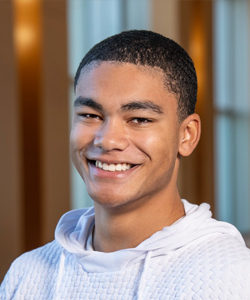
by Mary Rupert
Amiel Green II appreciates the dual enrollment program in the Kansas City, Kansas, Public Schools.
He was able to enroll in college classes while still at Washington High School.
Green took 46 college credits for free while still a high school student, going to Kansas City Kansas Community College.
Now he is in the second semester of his senior year at Rockhurst, and is teaching full time.
“I’m very blessed, I have a wonderful job, I feel I can give back in my community’s time of need, that’s done so much for me,” Green said recently.
Cooperative agreements between school districts and colleges, called dual enrollment, allow high school students to earn college credit. In the KCK district, students don’t have to pay for the college credits.
Green works as a substitute teacher in the school district. Formerly, students needed to have an associate degree to be a substitute teacher, but because of the teacher shortage during COVID, Kansas allowed those with high school diplomas to be substitute teachers.
“I think it’s possible for high school students that are sophomores in high school now to be able to graduate with associates degrees and help address the need in the district,” Green, whose mother was also a substitute teacher, said.
As a substitute, Green teaches science at Gloria Willis Middle School, and he said he likes to tell students about the benefits of the dual enrollment program.
“I try and let all my students, not just in the classroom, but studenets in school, know about the opportunities they have,” Green said.
The dual enrollment program made a difference in his life, shortened the time he had to spend in college, and resulted in financial savings, he said.
It was a whole year’s worth of tuition and loans he saved, and also, he will be starting his doctorate program a year sooner, he said.
His ultimate goal is to obtain his doctorate degree and work in a lab, while perhaps continue teaching. He is also interested in acting.
“I do have a passion for science and teaching,” Green said. He recalled his mother was a substitute teacher in his junior year of high school. Unfortunately, she died in his senior year.
“It’s a really good way for me to keep up her memory, too,” he said. They made a plan for them both to be able to do substitute teaching.
District programs under discussion currently
KCK school district programs currently are under discussion at the KCK school board level, where the board is determining next year’s budget.
The board is discussing the budget, while waiting for the Kansas Legislature to determine its final bills on state aid.
The school board on Wednesday took a vote to support a $15 minimum wage for all employees who were below that level. Also, a board member brought up in discussion Wednesday programs such as Diploma Plus, to determine how much use they are getting from students.
The board member pointed out that a district goal was to have all students enrolled in the Diploma Plus program by 2031, but a large decline was reported this year in the number of students who were in the Diploma Plus program. The board member requested data showing results for the program.
Superintendent Anna Stubblefield said they are in the process of gathering data, but historically, they are not seeing data for the program.
She said 38 school districts in the region were part of the Kauffman learning programs, including dual credit programs, with KCK having higher participation than other districts in Greater Kansas City.
She said 48 percent of students were involved in these programs last year, and if other Kauffman programs such as internships were included, it would be about 60 percent of KCK students.
Creating new opportunities for students
At Rockhurst University, Green helped create a student group, Bipoca+, that is inclusive of Black, indigenous, Asian and other peoples of color. He is vice president of the group. The group encourages a safe space to learn about other cultures, he said.
Green also is on scholarships at Rockhurst University. He also did an internship at the University of Kansas Medical Center.
Green currently has a job in the lab at the Stowers Institute, where he works after school.
He said he chose to be a researcher and pursue a doctorate degree instead of a medical degree. His major is bioethics. He said he feels that being a reseearcher would be a way to make a contribution to science.
Green said he feels that although opportunities exist in the KCK school district, such as the dual enrollment program, not enough students are taking advantage of them.
Green agreed that without the dual enrollment program, he probably would not have had the same opportunity to continue his education, enter the science career field and become a substitute teacher.
